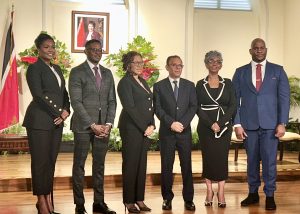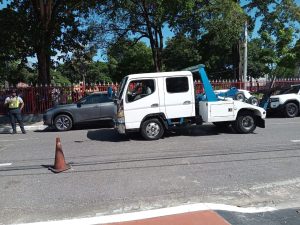
DESPITE all the talk of a potential new vaccine for the novel coronavirus, I fear Covid-19 is going to be around for years to come.
In previous articles, I wrote about one of the new normal in court matters being virtual hearings (hearings being conducted via computer using Microsoft Teams, which is something like Skype).

If I’m right, virtual hearings will be around for quite some time. I recently completed a very long civil trial conducted completely virtually. Read on, and I’ll tell you how that worked out.
This trial went on for many days and involved multiple parties. There were several witnesses of fact (persons who give evidence of what they saw, heard etc) and several expert witnesses (persons with specialised knowledge e.g. doctors, who give their opinion on the issues of the case).

Some of these experts were abroad and so was one of the attorneys. Initially, I thought having a virtual trial with so many people involved, both locally and foreign based would be a logistical nightmare! But it actually worked out quite well.
For every day of trial, the court would email the lawyers a link to join the trial the next day. The lawyers would then forward the link to their respective witnesses.
The trial judge’s JSO (Judicial Support Officer) acts as the gatekeeper and controls who wishes to have access to the trial via the Microsoft Teams link.

Each party, witness or expert would be in their respective offices or homes, including the judge. As far as possible the virtual hearing is to be conducted as if it were a physical hearing, so the usual wearing of robes etc. applies.
However, there is no standing and bowing as is the usual practice when the judge enters a physical courtroom. And no recordings of the trial are permitted, except by the court.
A witness has the choice to give the oath (that the evidence they shall give to the court in the case shall be the truth, the whole truth and nothing but the truth) by being sworn in using a religious text such as the Bible or to affirm (no religious text used). Usually the witness will be physically in the office of the attorney who is relying on their evidence. That attorney should have the specific religious text available to permit such swearing in.

In terms of equipment needed for the virtual hearing, all that is needed is a solid internet connection, a reliable computer/laptop with a camera and built in or external speakers.
For some strange reason, the internet connection in the afternoon period was somewhat choppier than mornings. Why that is may be a question for the internet providers.
But one theory is that there are more persons collectively using the internet in the afternoon than mornings, resulting in lowered bandwidths.

Technical issues did occur, a common one being temporary visual and audio disruptions presumably caused by the bandwidth issues.
However, the technical issues were usual temporary, and did not stop the Trial from proceeding.
When it came to producing documents for the witness or expert to look at, because the trial was virtual, the witnesses needed to have the relevant document at their physical location.

That would be a preparatory task for trial to be done by the attorneys for the respective witnesses. However, the court usually also has scans of the documents available, and with permission, will be able to put the specific document on the screen for the witness to see.
All in all, the trial timetable was kept, and they were no unforeseen delays. Much had to do as well with the courtesies, professionalism and preparations of the respective
Attorneys and the obviously substantial infrastructural work, training and ongoing experience of the judiciary. I may go as far to comment that the virtual trial surpasses a physical hearing in the ability to see and hear the evidence of each witness/expert, since the witness appears much closer than in a physical courtroom.
In time, I am confident that all technical issues that occur with these virtual hearings will be ironed out. In my opinion, the virtual hearings are working well. Even after Covid-19, I hope virtual hearings would remain an option for litigants and the court. It might just be the way of the future.
Copyright © 2020 Neela Ramsundar, LL.B (HONS), L.E.C Civil is a Litigation Attorney at Law & Certified Mediator.
Disclaimer: The contents of this article are for general informative purposes only. It does not provide legal advice and does not create an attorney-client relationship with any reader. For legal advice on your specific situation, please contact an Attorney-at-Law of your choosing directly. Liability for any loss or damage of any kind whatsoever allegedly incurred a consequence of using content in this article is thus hereby excluded to the fullest extent permitted by law.
![]()











